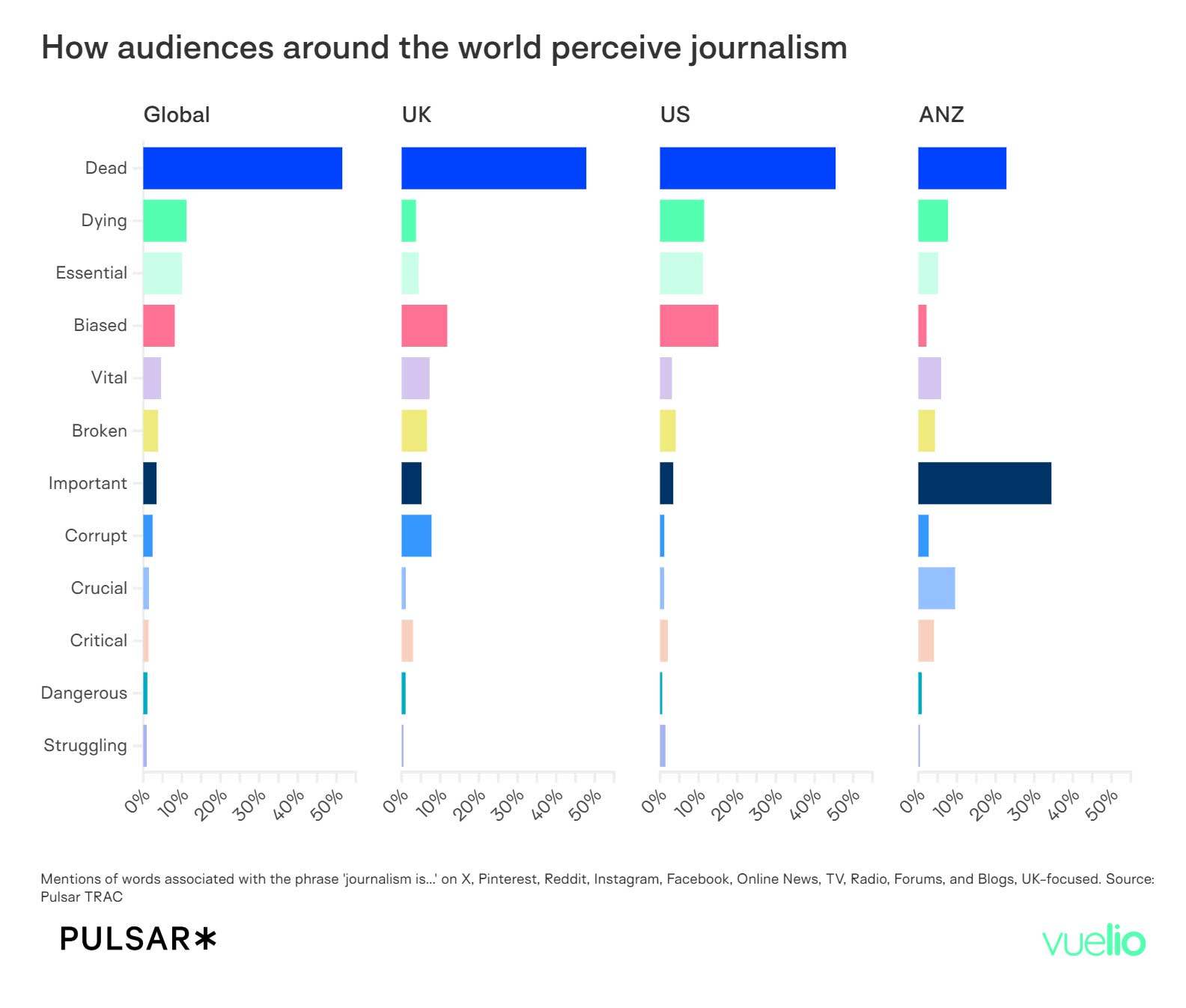The state of journalism in 2024: What do audiences think?
PRs will always need journalists, and journalists – in turn – will always need an audience. But how do audiences across the world see journalism in 2024?
While the media has always had to evolve to meet the changing needs and expectations of its audiences, this requirement has only accelerated in recent years. The changing role of journalists in our fast-moving modern climate presents challenges – for society as a whole, media organisations, and for the PR and comms industry professionals who navigate the media landscape.
How has citizen and independent journalism on platforms including TikTok, and in increasingly popular formats like podcasting, impacted the way news is shared? How are international news brands and local reporters each effected by these alternatives to ‘traditional’ news sources? And how do stories spread across media, platforms, and audiences in this climate?
Journalism is…
These are all questions we’ll be exploring over the coming months, as we conduct our research into journalism and news audiences. But first, to investigate the current perception of journalism across the world, we’ve analysed over 1.2 million media and social data points internationally, tracking mentions of ‘Journalism is…’ from May to September 2024.
Let’s begin with a look at the differing attitudes towards journalism across the world, and specifically, the UK…
How is journalism perceived in the UK in comparison to other regions?

The short answer – not in a particularly positive light. When tracking words commonly used following the phrase ‘Journalism is…’ online, ‘dead’ tracked the highest in the UK, followed by ‘biased’, and ‘corrupt’.
The source of this negativity isn’t hard to find, with press coverage of this summer’s UK General Election sparking criticism from the public across social media en masse. As debates, interviews, and analysis filled television schedules and column inches, the people watching and reading at home went online to share their frustrations, with high-profile journalists bearing the brunt.
The US audience shared a similarly dim view of journalism across social and online media – also unsurprising, perhaps, considering the political unrest stirring in the light of their own leadership race.
While the US and UK are aligned on attitudes towards the media, the ways in which they are expressed in public spheres and the media is where they differ (and not just in the UK audience’s willingness to share opinions with a sprinkling of swear words in their X posts).
So which audience of those we tracked considers journalism most important? Those in Australia and New Zealand. ‘Journalism is important’ was a more popular opinion shared online than ‘journalism is dead’ in these regions. A higher number also believed journalism to be ‘crucial’ than in the US and UK.
Is journalism ‘dead’?
Aside from UK fans disagreeing with reporting regarding their favourite sports team, celebrity, or other niche personal interest, the sharing of the view that journalism is ‘dead’ among UK news audiences has been rampant.
2023’s Edelman Trust Barometer found that the UK is one of the countries with the lowest faith in the media. Of the 27 countries surveyed, respondents were only less trusting of the news industry in Japan and South Korea.
While trust was up by 2% from Edelman’s previous survey in 2022, regaining confidence from the public is going to be hard going for the UK news industry. A consideration being taken seriously, as shown by the debates happening at media industry events across the country, including last year’s Society of Editors’ Media Freedom Conference.
The past year has also seen criticism of media reporting on the ongoing Gaza conflict, with disconnects between images and video shared on social media, public protests happening across the world, and the choices made in media coverage sparking further distrust.
Is journalism still ‘crucial’, ‘essential’, and ‘important’?
While use of positive descriptors by those sharing their view of journalism in the UK was much lower than use of the more negative ones, news reporting – in all of its different formats – continues to be cited as ‘important’…by invested communities. Journalists themselves, and those in adjacent industries, see and share reasons for optimism, but how can this be transmitted to audiences who have become distrustful, and disconnected?
Among the challenges facing the news industry – misinformation, lowering revenues, and distrust – audiences still seek information, and reporters, broadcasters, and content creators of all kinds are adapting to provide this.
Media brands making the effort to stay attuned to changing audience needs are building back loyalty and trust. For some recent examples: The Independent has doubled its profit and revenue over the last five years; the Financial Times is adopting data-driven personalisation as part of an audience-first strategy; and Reach plc’s launch of its Reach Studio hub is bringing each of its brands to new viewers in new formats.
The current state of journalism in the UK is in flux, and the prognosis can perhaps seems bleak. But there are causes for optimism to be found in emerging audience behaviours, platforms, and brands, which we’ll be exploring as part of our continued State of Journalism series.
Interested in how the media is evolving? Sign up for the 23 October Vuelio and Pulsar webinar ‘The New News Audiences’.









Leave a Comment